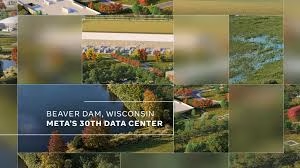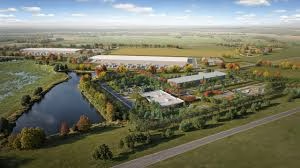Meta commenced construction on its first Wisconsin data center campus in Beaver Dam on November 12, 2025. This project is valued at over $1 billion and represents the company’s 30th global facility. The facility’s infrastructure is specifically engineered to handle intensive artificial-intelligence (AI) workloads, reinforcing Meta’s investment in next-generation computing capacity. The development is one of Meta’s significant data center projects currently underway in the United States.
Mortenson Leading Construction of Meta’s $1 Billion Wisconsin Data Center
Mortenson is serving as the general contractor for Meta’s substantial data center project in Beaver Dam, Wisconsin. The partnership was established with the official announcement on November 12, 2025, when Meta confirmed its investment in the $1 billion facility. This development represents a significant expansion of the region’s technological infrastructure, providing critical capacity for artificial intelligence and cloud computing demands within the United States.
The scope of work assigned to Mortenson encompasses all phases of the construction process for the 700,000-square-foot, AI-optimized facility. Their responsibilities range from initial site preparation and the installation of fundamental infrastructure to the precise integration of complex mechanical, electrical, and plumbing (MEP) systems. Mortenson is also tasked with delivering robust power systems and connectivity solutions, leveraging extensive experience in technical construction projects to meet the facility’s specific operational requirements.
Known for its expertise in large-scale technical and data center construction, Mortenson is implementing innovative methodologies to manage the project. The construction plan incorporates advanced techniques such as Building Information Modeling (BIM), robotic automated layout systems, and modular assembly to enhance efficiency and maintain project timelines. The facility is on track for completion in 2027 and is expected to have a lasting economic impact and provide ongoing job opportunities within the local community.
Meta said the Wisconsin site will feature the company’s latest “AI-ready” data center architecture. A design integrating high-density compute capacity and advanced cooling efficiency to support the training and deployment of large AI models across its platforms.
How will the campus be powered?
To power the campus, Meta is working with Alliant Energy to develop new grid infrastructure capable of delivering hundreds of megawatts of clean energy. The company and its partners expect to invest nearly $200 million in substations, transmission lines, and network reinforcements to meet long-term demand.
Consistent with Meta’s global sustainability goals, the Beaver Dam facility will be matched with 100 percent renewable power and employ dry-cooling systems that eliminate operational water consumption. Meta has also committed to local wetlands and watershed restoration projects to offset any residual water use. They have also pledged $15 million to Alliant Energy’s energy assistance fund for needy families and partnered with Ducks Unlimited to restore local wetlands.
Meta is actively working to power all its data centers with clean energy and has entered into long-term power purchase agreements (PPAs) with independent power producers, including Treaty Oak Clean Energy, to support major utility-scale solar projects such as those in Louisiana. These agreements deliver hundreds of megawatts of renewable energy to local grids, advancing Meta’s sustainability and clean energy goals.
Jobs
Construction is expected to create up to approximately 1,000 construction jobs and about 100 permanent technical and operational positions once the data center is operational. The groundbreaking was also attended by state and local officials. Including the leadership of the Wisconsin Economic Development Corporation and Alliant Energy, along with the Meta leadership.
The project is anticipated to have a lasting positive impact on the region. During the project’s official announcement on November 12, 2025, WEDC Secretary and CEO Missy Hughes noted, “Meta’s investment in Beaver Dam represents a generational project for Dodge County – one that strengthens our clean-energy infrastructure while expanding high-tech employment opportunities.”
Company officials said the site selection reflects Wisconsin’s growing capacity to support large-scale technology infrastructure through workforce development, reliable renewable-energy resources, and pro-industry policy frameworks.
Site work, including grading and utilities relocation, will continue into 2026, with full commissioning scheduled in 2027. When operational, the Beaver Dam campus will join Meta’s growing North American data-center network supporting cloud services, AI research, and immersive digital platforms such as Horizon and Instagram.

Meta Beaver Dam AI Data Center: Project Factsheet
Overview of the Project
Developer: Meta Platforms, Inc.
Location: Beaver Dam Commerce Park, Dodge County, Wisconsin
Total Investment: $1 billion
Facility Size: 700,000+ square feet
Status: Groundbreaking complete, excavation underway, Nov. 12, 2025
Economic Impact
Jobs Created:
1,000 construction jobs (peak)
Permanent operational positions: 100
Infrastructure Investment:
Nearly $200 million in utility upgrades
New utility substations
Transmission Line Improvements
Improving network infrastructure
Tax Base: major growth for Dodge County and Beaver Dam
Sustainability Commitments
Energy:
100% renewable energy match for electricity consumption
Clean energy-powered operations
Water:
Dry cooling system (no water cooling needed).
Net restoration of water by 2030 (more restored than consumed)
Environmental:
On-site wetland preservation
Partnership with Ducks Unlimited for wetland restoration.
Creation of native habitat for wildlife, birds, and plant species
Community Support:
$15 million contribution to Alliant Energy’s assistance fund for low-income energy users

Leave a Reply